#African-military controlled
Text
Academia is so left-wing until you actually have to read research papers and then it’s just 20 different papers on why colonization was okay
#I swear to god I read a paper that said the Koreans should’ve thanked the Japanese#and another on why settler colonization was actually beneficial for North Africans#several others I should say#and it’s always like ‘these Africans were so eager to help their new rulers so many of them joined the military and showed theirpatriotism!’#and then you figure out by painfully piecing things together that no. actually. it’s just that the colonizers controlled the economy & jobs.#none of those Africans really had any choice at all— the only way to make money & keep their families alive was through military service#serving for a country you hate to help them suppress other groups just like you. and then the world asks for your *gratefulness*#like no! colonization is fucking bad!!!!#to delete later#was gonna write a fic to vent my emotions but I have neither the time nor the skills required for what I want to do#might try anyways but unlikely#academic discussion: slavery is the last stage and end goal of capitalism and the very principles of American society perpetuate racism#academic research: :( black people have it so easy whites are soooo overhated :( :( :(#also featured here: me vs the character count limit on tags
2 notes
·
View notes
Text
Im quite literally so done with this shit. i keep on going back and forth between hiding all the i/p related tags, but then I realize that its seeped EVERYWHERE. It's in the motherhood tag, and jewish history tag, and everything else. I can't fucking escape it. I opened tiktok yesterday to see one of my favorite characters (iron man) weaponized to support the one group that wants to see me dead, the user saying that iron man would support palestine, and be an antizionist because he "spoke out against the public" and he wasn't like the sheep. It frustrates me to no end this horrible cycle of fucking misinformation that exists.
As a Gen Z, I simply do not understand how its reached this point? I can't even write all my feelings and information about how shitty this is in a single sitting because 1) it'd be too long and 2) my joints wont let me write that long. But how did it reach this point?
How did it reach the point where jewish/isreali stores are fucking marked to notify the public. Their windows are being broken and the stores are being robbed. How did it reach the point where jewish students on some campuses are told to stay home? how they're harassed out of specific areas, and campuses have been made unsafe? How did it reach the point that people literally have written "I ♡ Houthis & Hamas" and "no mercy for Jews."? How did it reach the point that there are nazi symbols, and hanging deadmans, and communist symbols being drawn on college campuses? How is it possible that students are calling for the end of jewish student unions and hillel international on campus? that'd be like calling for the end of the fucking muslim student organization, or disbanding an african-american affinity group. Which would never be acceptable, but apparently its fine when its jews.
I'm sick and tired of all the horrible conditions of palestenian cities being blamed on israel. Palestine is its own country. They had their own government until they elected Hamas to lead them. Hamas, who diverted all their funds to the military. Hamas, who uses hospitals and public spaces as their bases. Hamas, who built miitary tunnels under cities so that when they're invaded, the cities will collapse on itself. Hamas, who steals all humanitarian aid from its citizens. Hamas, who controls palestenian media and teaches hatred to its children. Hamas, who wants their citizens to become martyrs for their country, to die for their goal. Hamas, whose number one goal is to eradicate all jews. Hamas, who denies the existence of the holocaust. Hamas, who enlists children as soldiers and suicide bombers. Hamas, who has has never expressed an interest in a 2 state solution.
Is this the organization you consider freedom fighters? because i dont think they should ever, in any context, be called that. Hamas is nothing but terrorists.
Yes, the deaths and treatment of palestenian citizens is horrible. but no, this is not a genocide. Israel is trying to rid them of Hamas, because quite literally, no country should ever be forced to live in "harmony" with a terrorist group. Especially one who denies their existence and actively wants to kill them all. Israel has been letting palestenians get jobs in the country, has let palestine use their resources and water, all for years. They've let hamas continously bomb them, they've gotten used to a life of bomb shelters in every residence. Hamas has done nothing but crippled their country's own economy and society.
None of the surrounding coutnries want to let in palestenians, or live with palestenians. Egypt wants to annex Gaza, and Jordan wants the West Bank. In fact, they did own that land for a part of history! Yet Israel has let palestenians govern themselves for years, even when Hamas originally came into power, they didn't interfere. Not until they were provoked.
Yes, Israel has flaws. But welcome to the fucking real world, princess. Every country has flaws. Even America, you dipshits. This is not a little fandom for you to play sides on. its not some fictional world that has a black and white solution. Yes theres going to be deaths, just like in any other WAR. But you really can't call for the destruction of a country on the basis that they're trying to make sure they're allowed to stay a country? Because guess what honey bunchkins? "from the river to the sea" really doesn't mean what you think it does. It just means that you want to kill all jews, or at best, forcefully remove them and scatter them around the middle east. (to countries that have killed them in swaths in the past. To countries that have emprisoned jews for helping others escape. To countries that avidly hate jews and want them dead). I don't understand how that would mean peace in any way shape or form?
Not only that, but half of "protestors" and "activists" for palestine, haven't even done basic research. They dont know what river or sea theyre talking about. They dont know that "palestine" was not a palestenian state in 1948, but it was instead a BRITISH MANDATE, that was NOT fully occupied by palestenians. In fact,
"palestenians" weren't a thing. Palestenians are just muslims and arabs from countries like syria, who lived alongside jews and christians in the same land (which was largely uninhabited for the most part). Yeah, you heard me right.
Honestly my thoughts on this issue are so scattered its so hard to make a solid points when I can just keep on going forever.
Fact is, Israel deserves to be a country. No one should be supporting Hamas. Everyone should be supporting the eradication of Hamas (and I mean Hamas not palestenian citizens). I don't get how these are debated, and seriously don't understand how citizens of america are so quick to support a terrorist group, to resort to antisemitism.
Im so done with this all. I cant believe we have to tell you gentiles that stoning a 13-year old kid for being jewish is horrible. That throwing a brick through an israeli-owned cafe in New York is horrible. That students not being able to be on campuses because of their religion or ethnicity is horrible.
This has to end.
Do your research, or don't speak (and terrorist-controlled propoganda channels don't count).
#funkowrites#jewblr#jumblr#israel solidarity#judaism#jewish tumblr#stop antisemitism#jewish#antizionism is antisemitism#if you try to call me slurs or a zio or anything in the comments then you're the issue#research before you speak#free palestine from hamas#i stand with israel#stop blaming israel#blame hamas#if you can't condemn hamas then you shouldn't be having a conversation about this#learn to have civil debate or dont speak about this at all#you should be able to talk to a jew about this without calling them slurs or issuing death threats#I dont gaf if you tell me to kms#if you do then I just know you're not worth speaking to
447 notes
·
View notes
Text
JIMMY CARTER: ISRAEL TICKS APARTHEID BOXES
In this 2007 clip from a @democracynow interview, former US President Jimmy Carter (1977-81) highlighted how the state of Israel is not only like the South African apartheid state but more restrictive.
In 2022, Amnesty International declared Israel an apartheid state in a 280-page report that documented how Tel Aviv controls Palestinian territories and people. Other groups, including Human Rights Watch and Israeli human rights organisation B’Tselem, came to the same conclusion a year prior.
Since the 7 October escalation in the 75-year Palestine-Israel conflict, Israel has killed nearly 32,000 Palestinians and injured more than 73,000 people. Because Israel controls movement into and out of the Palestinian territories, it has blocked the entry of foreign aid and Palestinians’ attempts to flee Israel’s military attacks.
However, the United States has provided the most foreign aid to Israel than to any other country since 1948. That funding continued during Carter’s term.
#israel is an apartheid state#israeli apartheid#palestine#gaza#free palestine#israel#jerusalem#i stand with palestine#فلسطين#free gaza#israel is a terrorist state#israeli war crimes#israelis are terrorists#israelis are war criminals#israeli terrorism#israel is committing genocide#israel is a war criminal#israel is evil#jimmy carter
446 notes
·
View notes
Photo

Kingdom of Abyssinia
The Kingdom of Abyssinia was founded in the 13th century CE and, transforming itself into the Ethiopian Empire via a series of military conquests, lasted until the 20th century CE. It was established by the kings of the Solomonid dynasty who, claiming descent from no less a figure than the Bible's King Solomon, would rule in an unbroken line throughout the state's long history. A Christian kingdom which spread the faith via military conquest and the establishment of churches and monasteries, its greatest threat came from the Muslim trading states of East Africa and southern Arabia and the migration of the Oromo people from the south. The combination of its rich Christian heritage, the cult of its emperors, and the geographical obstacles presented to invaders meant that the Ethiopian Empire would be one of only two African states never to be formally colonised by a European power.
Origins: Axum
The Ethiopian Highlands, with their reliable annual monsoon rainfall and fertile soil, had been successfully inhabited since the Stone Age. Agriculture and trade with Egypt, southern Arabia, and other African peoples ensured the rise of the powerful kingdom of Axum (also Aksum), which was founded in the 1st century CE. Flourishing from the 3rd to 6th century CE, and then surviving as a much smaller political entity into the 8th century CE, the Kingdom of Axum was the first sub-Saharan African state to officially adopt Christianity, c. 350 CE. Axum also created its own script, Ge'ez, which is still in use in Ethiopia today.
Across this Christian kingdom, churches were built, monasteries founded, and translations made of the Bible. The most important church was at Axum, the Church of Maryam Tsion, which, according to later Ethiopian medieval texts, housed the Ark of the Covenant. The Ark, meant to contain the original stone tablets of the Ten Commandments given by God to Moses, is supposed to be still there, but as nobody is ever allowed to see it, confirmation of its existence is difficult to achieve. The most important monastery in the Axum kingdom was at Debre Damo, founded by the 5th-century CE Byzantine ascetic Saint Aregawi, one of the celebrated Nine Saints who worked to spread Christianity in the region by establishing monasteries. The success of these endeavours meant that Christianity would continue to be practised in Ethiopia right into the 21st century CE.
The kingdom of Axum went into decline from the late 6th century CE, perhaps due to overuse of agricultural land, the incursion of western Bedja herders, and the increased competition for the Red Sea trade networks from Arab Muslims. The heartland of the Axum state shifted southwards while the city of Axum fared better than its namesake kingdom and has never lost its religious significance. In the 8th century CE, the Axumite port of Adulis was destroyed and the kingdom lost control of regional trade to the Muslims. It was the end of the state but not the culture.
Continue reading...
157 notes
·
View notes
Text
Most Afro-Palestinians in this tight-knit community came to the region as religious pilgrims during the British Mandate for Palestine, and many have been part of the Palestinian resistance movement since Israel’s establishment in 1948. Others arrived as volunteers with the Egyptian army to fight against Zionist militias taking control of historic Palestine during the Arab-Israeli war.
The community has played a pivotal role in the history of Palestinian resistance. Locals say that the first Palestinian woman to be imprisoned for a paramilitary operation against Israel was Fatima Barnawi, a Nigerian-Palestinian detained in 1967 for the attempted bombing of an Israeli cinema in West Jerusalem.
Yet decades later, Afro-Palestinian youth continue to live their daily lives under Israeli control.
At just 17, Abdallah’s cousin, Jibrin, has already been detained five times by Israeli forces, mostly over allegations that he threw stones at Israeli police and military officers. While he and his friends face the same harassment as other Palestinians, he said, they sometimes experience “double-racism” for both being Palestinian and having dark skin.
“The soldiers are always cursing at me and interrogating me when I pass them. They try to provoke me so that I do something they could get me in trouble for,” Jibrin told Al Jazeera, noting that he has been beaten several times by Israeli police and soldiers during detentions.
“Most of those in my generation have the same experiences,” he added with a shrug. “It’s routine.”
#free palestine#palestinian prisoners' day#genocide#antiblackness#prison abolition#police abolition#abolition#zionist colonization#settler colony of israel
306 notes
·
View notes
Text
Chicago, Illinois is often considered to be on the periphery of the plantation. William Cronon's famous narrative of Chicago's relationships with the "Great West" positions the burgeoning city at the edge of American expansion into plantation agriculture in the Midwest and industrial farming on a national scale. [...] [W]e could also characterize the city as an anticipatory hub between the twin plantation figures of the pre-war American South and America's 20th century colonies [in Central America, the Philippines, and beyond]. During the Reconstruction years, Chicago emerged as a logistical center, channeling America's railroads and telegraph lines into itself. As parts of this communications node, Chicago newspapers and military police served to convert white anxieties about Black migration from the plantation South into new techniques and technologies of prediction that became transportable across a newly imaginable informational plane of US imperialism. [...] [I]n Chicago between 1875 and 1890, [...] white anticipations of African American migration from plantations in the South were translated into new information sciences and policing techniques that made their way to plantations in places like the Philippines. [...] [S]uch feelings were fundamental to linking plantations which at first seem so spatially and temporally distant. [...]
---
On May 3, 1879 the Chicago Tribune published a greatly anticipated investigatory series entitled, “The Negro Exodus: Causes of the Migration from the Negro’s Point of View” [...] the latest in a long sequence of deeply uneasy reports dating from 1860. From its location at the communicative center of all major US rail and telegraph lines, the Chicago Tribune undertook an imagined responsibility to inform its Midwestern audience of Black peoples’ movements and behaviors. [...] At the climax of the “Negro’s Point of View” series, [...] May 3, the Chicago Tribune presented its showstopping report from its correspondent in Vicksburg, Mississippi entitled “Letters Written by Negroes in Kansas to their Friends South”. In this report, the writer discusses his skepticism of earlier methods of [...] interviews with Black migrants. [...] [The newspaper] conducted its fact-gathering through the mass surveillance of Black peoples' letters [...] [to assess] inner motivations [...] about Black peoples’ “perceptions, enjoyments, and reasons” [...]. Such informational appetites became the anticipatory basis for 20th century enumerative practices. As Colin Koopman argues, informational fastening, or the atomization and separation of facts from Black peoples’ bodies, became commonplace during the Great Migration in the practice of racial statistics, criminology, and health policy directed at Black migrants [...]. [T]his desire for packaged information was itself made transferable into geographies beyond Chicago, and beyond the United States.
---
White Chicagoans’ prolonged concern over predicting Black behaviors and intentions materialized in 1877, when the city became a central hub of militarized response to a nation-wide railroad strike. Adjutant General Richard C. Drum, who commanded the Military Division of the Missouri (Western Frontier) in Chicago from 1873 to 1878, took control of Chicago’s military response to the Great Railroad Strike of 1877. In 1879, after his final year in the city, Drum moved to Washington, DC and proposed the establishment of the Military Information Division (MID) [...]. The MID, which formally established in 1885, maintained close ties to Chicago's local information collection system, adopting a Bertillon identification system of collecting and storing intelligence cards at the time that the National Association of Chiefs of Police established their central bureau of identification in Chicago in 1896 [...]. By the tun of the 20th century, Chicago's police force had expanded tenfold [...], and Drum's MID had amassed over 300,000 intelligence cards [...].
---
The affective atmosphere into which the MID intensified its own predictive techniques later traversed the Pacific Ocean into the Philippines. Alfred McCoy argues that the American introduction of communication technologies and surveillance techniques in governing the Philippines constituted the United States’ first information revolution (McCoy 2009: 18). Colonial police trained in the anxious habits of the MID, rendered the Philippines a laboratory
for securitized speculation. McCoy further contends that these informational “capillaries of empire” embedded themselves into the Philippines’ plantocratic-security state as well as US domestic surveillance practices. I add to McCoy’s argument by suggesting that trained feelings of white apprehension translated into imperial mechanisms for governing the Philippines through systems of intelligence cards, telecommunications infrastructure, policing units, and management sciences. Reminiscent of the psychological investigatory projects that saturated Chicago’s public life, the MID and its successors developed techniques for psychological examination and personality typing led by another Chicagoan, Harry Hill Bandholtz. [...] Bandholtz sharpened the MID's informational sciences by training Philippines police forces in the neurotic art of collecting every imaginable fact about Filipino behaviors [...].
---
Ultimately, the US colonial plantocracy in the Philippines built its authority around information infrastructures which had been trained on apprehensive practices and feelings emanating from Chicago’s racialized geography. [...]
[T]he informational networks that extended from the image of the American South, through the anticipation of Chicago's public, [...] animated the governance of colonial plantations in the Philippines [...].
---
All text above by: Jolen Martinez. "Plantation Anticipation: Apprehension in Chicago from Reconstruction America to the Plantocratic Philippines" (2024). An essay from an Intervention Symposium titled Plantation Methodologies: Questioning Scale, Space, and Subjecthood. The symposium was introduced and edited by Alyssa Paredes, Sophie Chao, and Andrés León Araya. The symposium was hosted and published by Antipode Online, part of Antipode: A Radical Journal of Geography. Published online 4 January 2024, at: antipodeonline.org/2024/01/04/plantation-methodologies/ [In this post, bold emphasis and some paragraph breaks/contractions added by me. Presented here for commentary, teaching, criticism purposes.]
#tidalectics#multispecies#abolition#incredible cant take this any more#like a big inescapable spiderweb#ecology#ongoing chicago discussion#ecologies
152 notes
·
View notes
Text
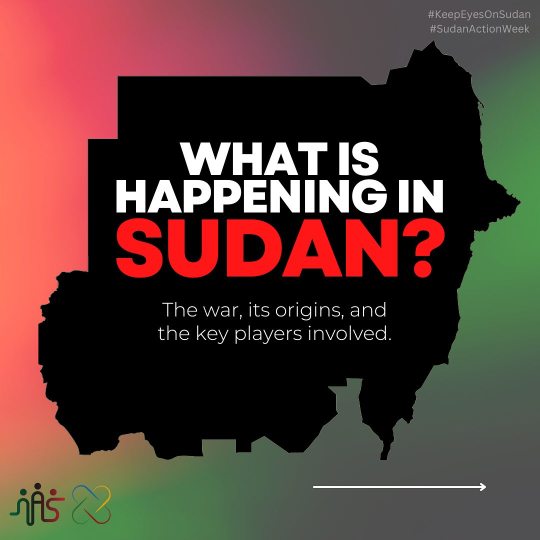
Via NasAlSudan
December 17 2023. #KeepEyesOnSudan #SudanActionWeek
Swipe through to build a foundational understanding of the war, its origins, and the key players involved. For actionable ways to support those in Sudan, check the link in our bio. Stay tuned for more posts this week.
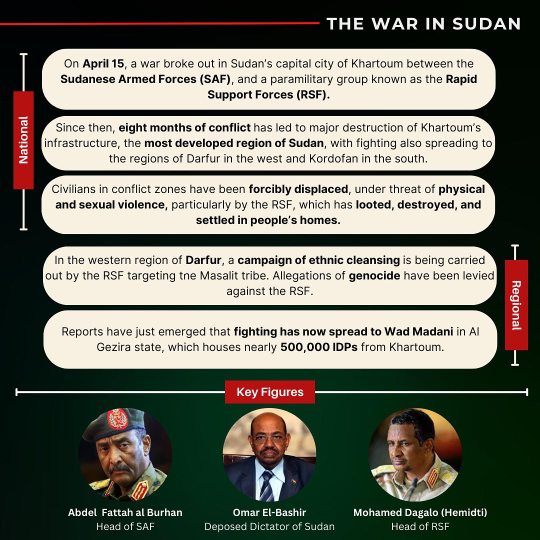
Transcript:
National:
On April 15, a war broke out in Sudan's capital city of Khartoum between the Sudanese Armed Forces (SAF), and a paramilitary group known as the Rapid Support Forces (RSF).
Since then, eight months of conflict has led to major destruction of Khartoum's infrastructure, the most developed region of Sudan, with fighting also spreading to the regions of Darfur in the west and Kordofan in the south.
Civilians in conflict zones have been forcibly displaced, under threat of physical and sexual violence, particularly by the RSF, which has looted, destroyed, and settled in people's homes.
Regional:
In the western region of Darfur, a campaign of ethnic cleansing is being carried out by the RSF targeting the Masalit tribe. Allegations of genocide have been levied against the RSF.
Reports have just emerged that fighting has now spread to Wad Madani in Al Gezira state, which houses nearly 500,000 IDPs from Khartoum.
Key figures:
Abdel Fattah al Burhan Head of SAF
Omar El-Bashir Deposed Dictator of Sudan
Mohamed Dagalo (Hemidti) Head of RSF
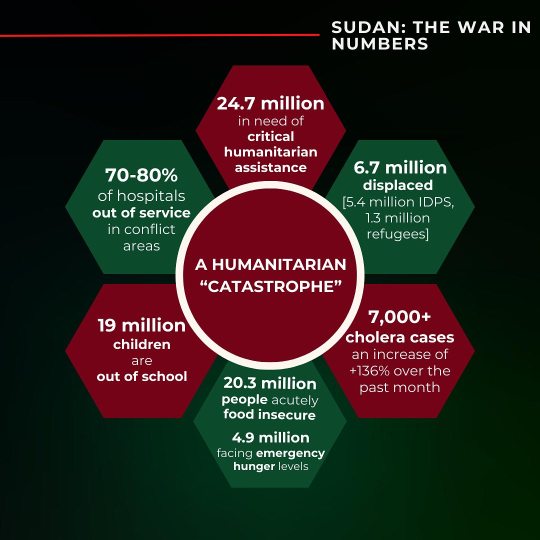
Transcript:
Sudan: the war in numbers
A humanitarian "catastrophe"
24.7 million in need of critical humanitarian assistance
70-80% of hospitals out of service in conflict areas
19 million children are out of school
20.3 million people acutely food insecure. 4.9 million facing emergency hunger levels
6.7 million displaced [5.4 million IDPS, 1.3 million refugees]
7,000+ cholera cases an increase of +136% over the past month
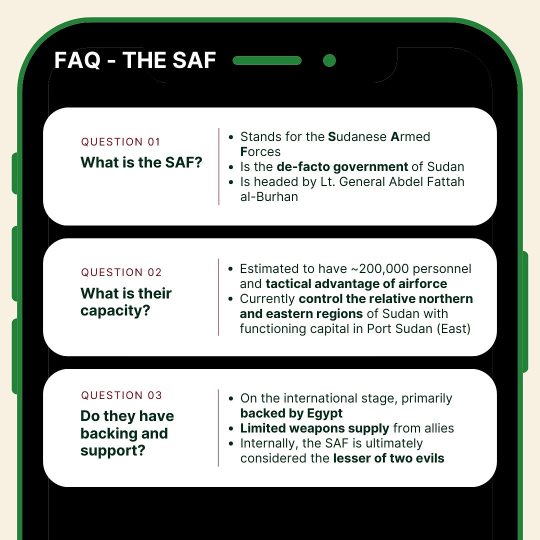
Transcript:
FAQ - THE SAF
QUESTION 01: What is the SAF?
Stands for the Sudanese Armed Forces
Is the de-facto government of Sudan
Is headed by Lt. General Abdel Fattah al-Burhan
QUESTION 02 What is their capacity?
Estimated to have ~200,000 personnel and tactical advantage of airforce
Currently control the relative northern and eastern regions of Sudan with functioning capital in Port Sudan (East)
QUESTION 03 Do they have backing and support?
On the international stage, primarily backed by Egypt
Limited weapons supply from allies
Internally, the SAF is ultimately considered the lesser of two evils
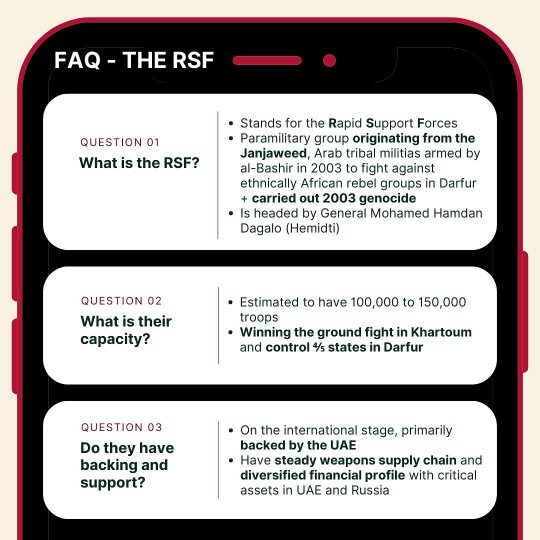
Transcript:
FAQ - THE RSF
QUESTION 01 What is the RSF?
Stands for the Rapid Support Forces
Paramilitary group originating from the Janjaweed, Arab tribal militias armed by al-Bashir in 2003 to fight against ethnically African rebel groups in Darfur + carried out 2003 genocide
Is headed by General Mohamed Hamdan Dagalo (Hemidti)
QUESTION 02 What is their capacity?
Estimated to have 100,000 to 150,000 troops
Winning the ground fight in Khartoum and control 4/5 states in Darfur
QUESTION 03 Do they have backing and support?
On the international stage, primarily backed by the UAE
Have steady weapons supply chain and diversified financial profile with critical assets in UAE and Russia
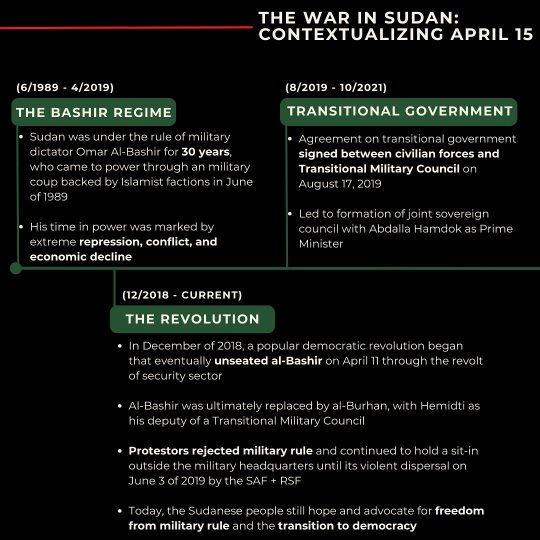
Transcript:
THE WAR IN SUDAN: CONTEXTUALIZING APRIL 15
(6/1989 - 4/2019) THE BASHIR REGIME
Sudan was under the rule of military dictator Omar Al-Bashir for 30 years, who came to power through an military coup backed by Islamist factions in June of 1989
His time in power was marked by extreme repression, conflict, and economic decline
(12/2018 CURRENT) THE REVOLUTION
In December of 2018, a popular democratic revolution began that eventually unseated al-Bashir on April 11 through the revolt of security sector
Al-Bashir was ultimately replaced by al-Burhan, with Hemidti as his deputy of a Transitional Military Council
Protestors rejected military rule and continued to hold a sit-in outside the military headquarters until its violent dispersal on June 3 of 2019 by the SAF + RSF
Today, the Sudanese people still hope and advocate for freedom from military rule and the transition to democracy
(8/2019-10/2021) TRANSITIONAL GOVERNMENT
Agreement on transitional government signed between civilian forces and Transitional Military Council on August 17, 2019
Led to formation of joint sovereign council with Abdalla Hamdok as Prime Minister
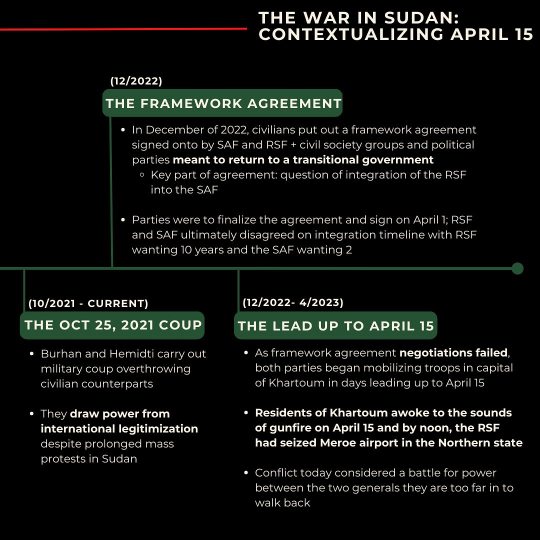
Transcript:
(10/2021 CURRENT)THE OCT 25, 2021 COUP
Burhan and Hemidti carry out military coup overthrowing civilian counterparts
They draw power from international legitimization despite prolonged mass protests in Sudan
(12/2022) THE FRAMEWORK AGREEMENT
In December of 2022, civilians put out a framework agreement signed onto by SAF and RSF + civil society groups and political parties meant to return to a transitional government
Key part of agreement: question of integration of the RSF into the SAF
Parties were to finalize the agreement and sign on April 1; RSF and SAF ultimately disagreed on integration timeline with RSF wanting 10 years and the SAF wanting 2
(12/2022-4/2023) THE LEAD UP TO APRIL 15
As framework agreement negotiations failed, both parties began mobilizing troops in capital of Khartoum in days leading up to April 15
Residents of Khartoum awoke to the sounds of gunfire on April 15 and by noon, the RSF had seized Meroe airport in the Northern state
Conflict today considered a battle for power between the two generals they are too far in to walk back

Transcript:
FRAMING ALLIANCES
Sudanese Armed Forces (SAF):
Egypt
Israel (Foreign Ministry)
Islamists
Iran
Saudi Arabia
Ukraine (SOF)
Armed Groups
Rebel groups that had taken up arms against the central government in the Bashir Era are forced to ally with the SAF due to the RSF's ethnic cleansing campaign. They include:
Justice and Equality Movement (Gibril Ibrahim)
Sudan Liberation Movement/Army (Minni Minawi)
Gathering of Sudan Liberation Forces (Abdallah Yahya)
Rapid Support Forces (RSF):
Israel (Mossad)
Libya (Khalifa Haftar)
United Arab Emirates
Central African Republic
Russia (Wagner Group)
Chad
Arab Tribal Leaders
Arab tribal leaders across the Western region of Darfur have pledged their allegiance and support to the RSF, with members of the tribes across the Sahel crossing into Sudan to join the RSF's assault as well.
Key tribes include: Beni Halba, Tarjam, Habaniya, Fallata, Misseriya, Taaysha, Rizeigat
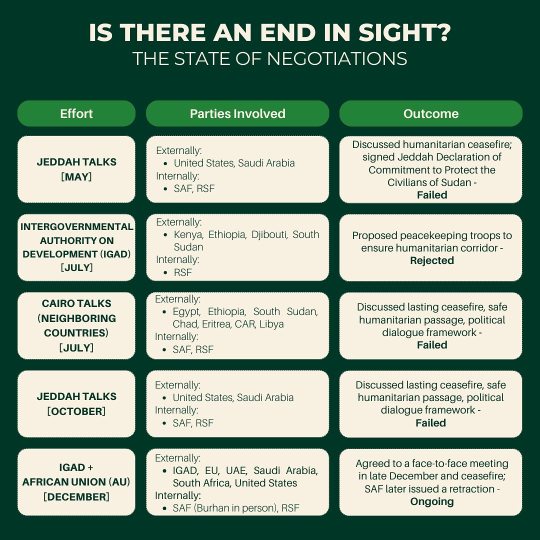
Transcript:
IS THERE AN END IN SIGHT?
THE STATE OF NEGOTIATIONS
Effort: JEDDAH TALKS [MAY]
Parties involved: Externally: United States, Saudi Arabia Internally: SAF, RSF
Outcome: Discussed humanitarian ceasefire; signed Jeddah Declaration of Commitment to Protect the Civilians of Sudan - Failed
Effort: INTERGOVERNMENTAL AUTHORITY ON DEVELOPMENT (IGAD) [JULY]
Parties Involved: Externally: Kenya, Ethiopia, Djibouti, South Sudan Internally: RSF
Outcome: Proposed peacekeeping troops to ensure humanitarian corridor - Rejected
Effort: CAIRO TALKS (NEIGHBORING COUNTRIES) [JULY]
Parties Involved: Externally: Egypt, Ethiopia, South Sudan, Chad, Eritrea, CAR, Libya Internally: SAF, RSF
Outcome: Discussed lasting ceasefire, safe humanitarian passage, political dialogue framework - Failed
Effort: JEDDAH TALKS [OCTOBER]
Parties Involved: Externally: United States, Saudi Arabia Internally: SAF, RSF
Outcome: Discussed lasting ceasefire, safe humanitarian passage, political dialogue framework - Failed
Effort: IGAD + AFRICAN UNION (AU) [DECEMBER]
Parties Involved: Externally: IGAD, EU, UAE, Saudi Arabia, South Africa, United States Internally: SAF (Burhan in person), RSF
Outcome: Agreed to a face-to-face meeting in late December and ceasefire; SAF later issued a retraction - Ongoing
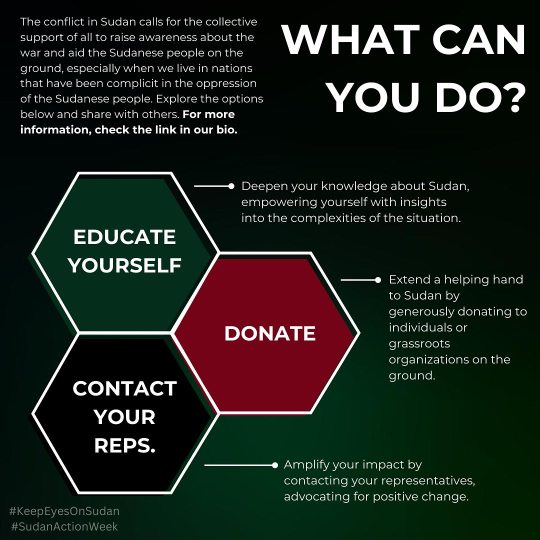
Transcript:
The conflict in Sudan calls for the collective support of all to raise awareness about the war and aid the Sudanese people on the ground, especially when we live in nations that have been complicit in the oppression of the Sudanese people. Explore the options below and share with others. For more information, check the link in our bio.
WHAT CAN YOU DO?
EDUCATE YOURSELF
Deepen your knowledge about Sudan, empowering yourself with insights into the complexities of the situation.
DONATE
Extend a helping hand to Sudan by generously donating to individuals or grassroots organizations on the ground.
CONTACT YOUR REPS.
Amplify your impact by contacting your representatives, advocating for positive change.
#sudan#keep eyes on sudan#KeepEyesOnSudan#Sudan Action Week#SudanActionWeek#i hope the way i formatted it is good#i saw a few hours ago that rsf retreated from wad madani outskirts
370 notes
·
View notes
Text
[France24 is French State Media]
Niger on Monday confirmed one of the world's biggest uranium mines had returned to public control after revoking the operating licence of French nuclear fuel producer Orano.
The company last week said it had been excluded from the Imouraren mine in northern Niger, in a move that highlighted tensions between France and the West African country's military rulers.
The government had not reacted before releasing a statement on Monday saying the Imouraren mine had returned "to the public domain of the [...]
It justified revoking the licence by saying Orano "never honoured its commitments" despite two "formal notices" handed to it by the mines ministry in February 2022 and March this year.[...]
The Imouraren mine sits on an estimated 200,000 tonnes of uranium[...]
[D]evelopment was frozen after the collapse in world uranium prices following the 2011 Fukushima nuclear disaster in Japan.
Niger's military rulers have vowed to review mining concessions in the country since taking power in a July 2023 coup, as part of its focus on national sovereignty.[...]
Niger in 2022 accounted for about a quarter of the natural uranium supplied to European nuclear power plants, according to data from the atomic organisation Euratom.
25 Jun 24
135 notes
·
View notes
Text





BREAKING: Burkina Faso has regained control of its gold mines from a British company, reportedly the largest mining company in Africa. In a significant move, President Ibrahim Traore has announced the nationalization of the gold mine.
In a bold and significant move, Burkina Faso has reclaimed control of two of its major gold mines, marking a shift towards greater resource sovereignty. The Boungou and Wahgnion gold mines, previously owned by an African mining company, have now been nationalized by the Burkinabé government as part of a deal finalized on August 27, 2024. This decision aligns Burkina Faso with a broader trend among African nations, particularly those under military rule, to assert greater control over their natural resources.
The nationalization deal, valued at approximately $80 million, marks a significant turning point in the country’s mining sector. The two gold mines were initially acquired by Lilium, an African mining firm, from the British company Endeavour Mining last year in a transaction worth over $300 million. However, tensions between the companies soon escalated, with Endeavour accusing Lilium of failing to meet payment obligations, while Lilium alleged that Endeavour had misrepresented the financial state of the mines.
This development bears resemblance to the actions of former Libyan leader Muammar Gaddafi, who nationalized Libya’s oil resources, contributing to the country’s significant economic growth.
118 notes
·
View notes
Text
Landscape helps capture the forms in which nations and movements literally and figuratively 'construct' or 'produce' nature, engineering its appearance and infusing it with significations—rendering landscape a 'cultural practice' rather than a given fact. Here landscape is both an object of investigation and a site of intervention; the very medium within which power and resistance are represented and conducted. Put differently, landscape is far from a neutral backdrop but is rather activated, serving as the medium of violence. Dispossession, deforestation, planting, land-grabbing, and acquisitions, privatization, re-modeling, clearance, or the destruction of infrastructures of life, including food sources, buildings, or supplies, all mobilize the landscape in their domination.
Representations of Middle Eastern and North African landscapes nearly invariably include desolate scenes of endless empty and parched deserts, decorated perhaps with an isolated string of camels, or a beach with large mounds of golden sand, a minaret, or an oil tower in the background. The temporality and general impression of these landscapes is slow, hazy, and dizzying, as if they are waiting for 'activation' by someone or something outside of it. Whether reproduced in academic scholarship, literature, film, tourist advertisements, or news media, these imagined colonial representations of the region's landscape place the environment centrally within them, projecting an understanding of the Middle East and North Africa as marginal, on the edge of ecological viability or as a degraded landscape facing imminent disaster due to human inaction. With this, an environmental imaginary enabled storytelling that pushed forward imperial interests in the name of 'development' and, later, of environmental 'sustainability' and 'protection.' In the case of the constructed 'Middle East,' as Diana K. Davis explains,
"Deforestation narratives have been particularly strong in the Levant region since the nineteenth century, where some of the most emotional accounts of forest destruction have hinged on the presumed widespread destruction of the Lebanese cedar forests illustrated in the cover image by Louis-François Cassas. Similar narratives of overgrazing and desertification were used during the British Mandate in Palestine to justify forestry policies as well as laws aimed at controlling nomads, such as the 1942 Bedouin control ordinance, in the name of curbing overgrazing. Such environmental imaginaries, once constructed, can be extremely tenacious and have surprisingly widespread effects."
In Palestine, the construction of an 'Israeli landscape' to redeem the purported damage done to the land by its indigenous population commenced with the first Zionist settlers in the nineteenth century and intensified with the establishment of the State of Israel in 1948. Reflected in former Prime Minister David Ben Gurion's 1951 public address to the newly formed Israeli Knesset (Parliament):
"We must wrap all the mountains of the country and their slopes in trees, all the hills and stony lands that will not succeed in agriculture, the dunes of the coastal valley, the dry lands of the Negev to the east and south of Baer Sheva, that is to say all of the land of Edom and the Arava until Eilat. We must also plant for security reasons, along all the borders, along all the roads, routes, and paths, around public and military buildings and facilities [ . . . ] We will not be faithful to one of the two central goals of the state—making the wilderness bloom—if we make do with only the needs of the hour [ . . . ] We are a state at the beginning of repairing the corruption of generations, corruption which was done to the nation and corruption which was done to the land."
This 'Israeli landscape' was largely cultivated through the multifaceted and by now well-documented eco-colonial practices of the quasi-governmental Israeli organization, Keren Kayemet L'Yisrael, the Jewish National Fund (JNF), which has since made striking efforts to position Israel as an environmental pioneer. Established in 1901, the JNF may very well be the first transnational environmental nationalist NGO, seeking to 'make the desert bloom' by planting forests, natural reserves, and recreational parks over the ruins of Palestinian villages, holy places, and historical sites. Distinguishing itself from other transnational Zionist organizations, such as the World Zionist Organization and the Jewish Agency, the JNF has since its inception portrayed itself as an environment-oriented nationalist organization, supporting the 'redemption' and 'reclamation' of the land through colonial policies presented in the language of preservation, maintenance, protection, and development of vital ecosystems and ecologically sound environments. Indeed, its public-facing promotional materials boast proudly that "Israel is the only country in the world that entered the twenty-first century with a net gain in the number of trees"—without context, of course, of the ways in which trees and the 'greened' landscape in the country are mobilized as weapons of erasure as part of a colonial imaginary that naturalizes non-Palestinian presence.
Shourideh C. Molavi, Environmental Warfare in Gaza: Colonial Violence and New Landscapes of Resistance
101 notes
·
View notes
Text
Let's talk about Sudan-
TRANSCRIPT UNDER CUT

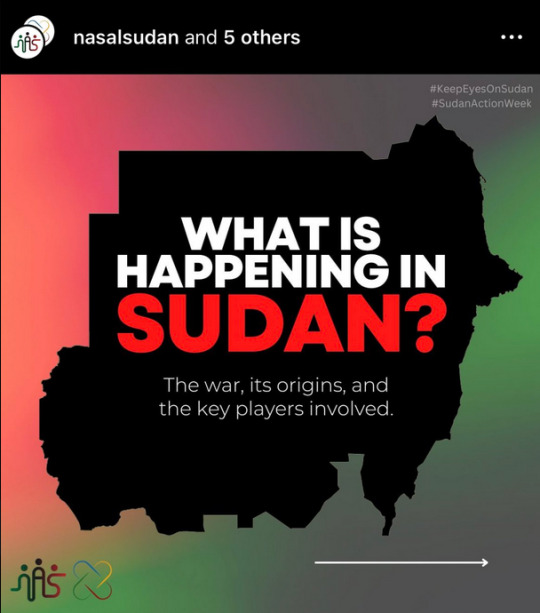
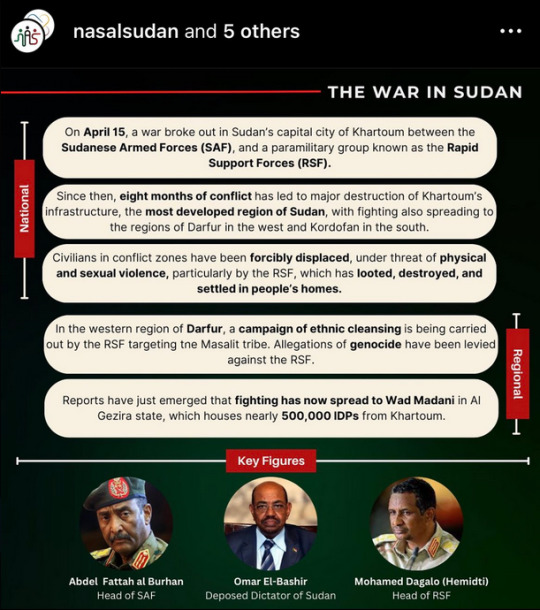
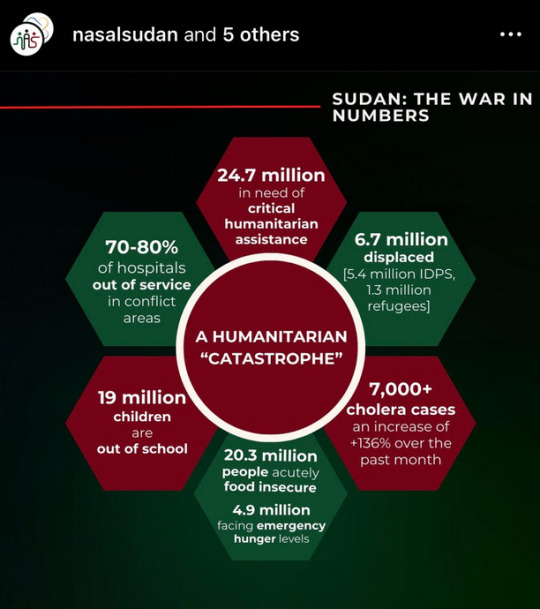

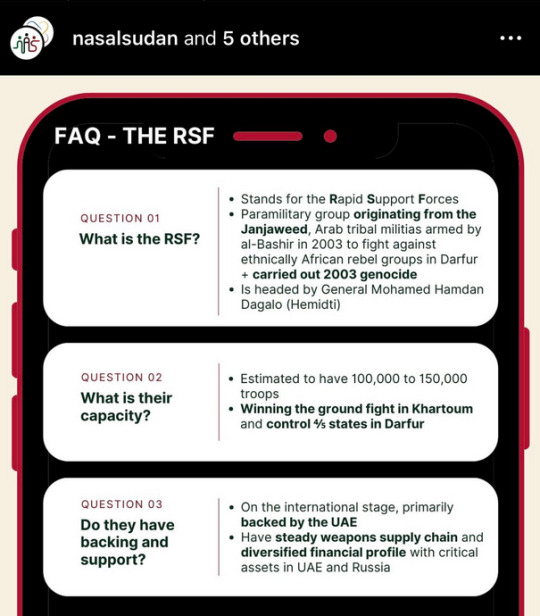
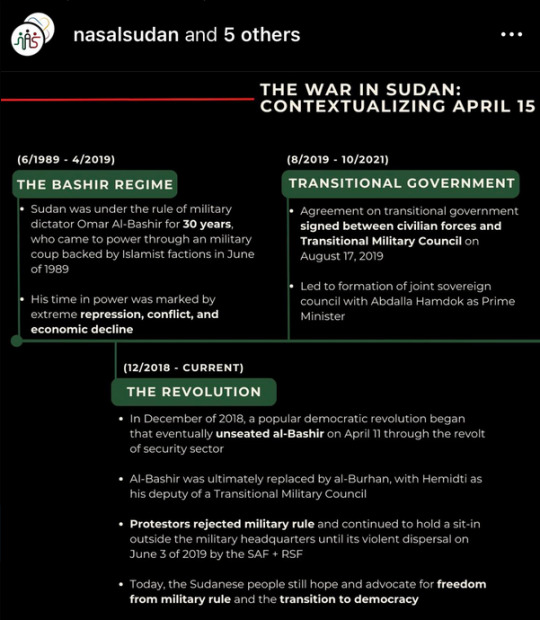
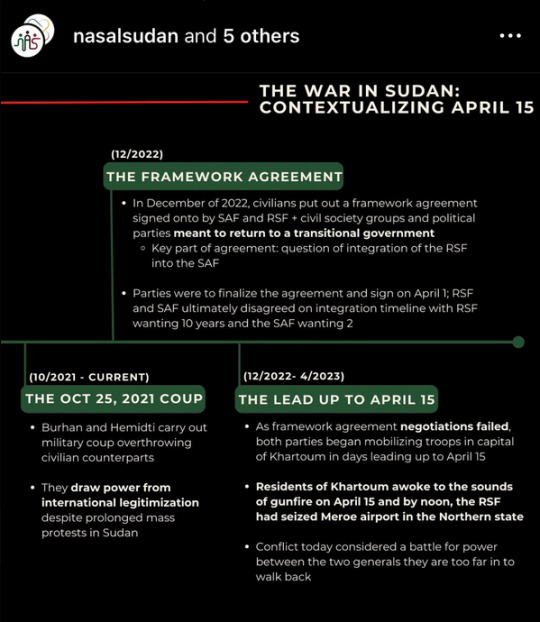
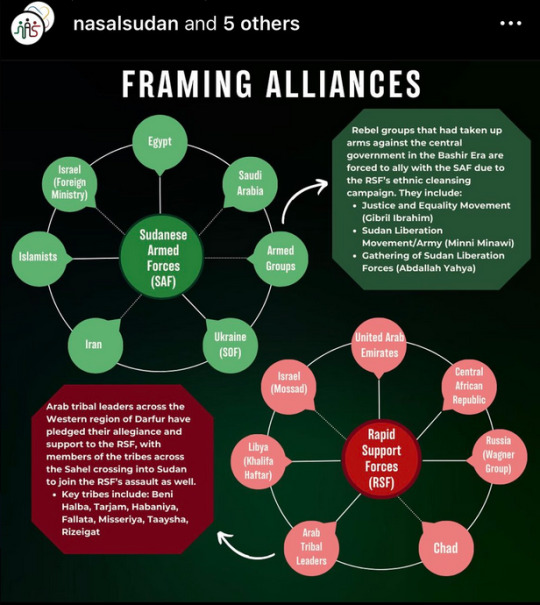
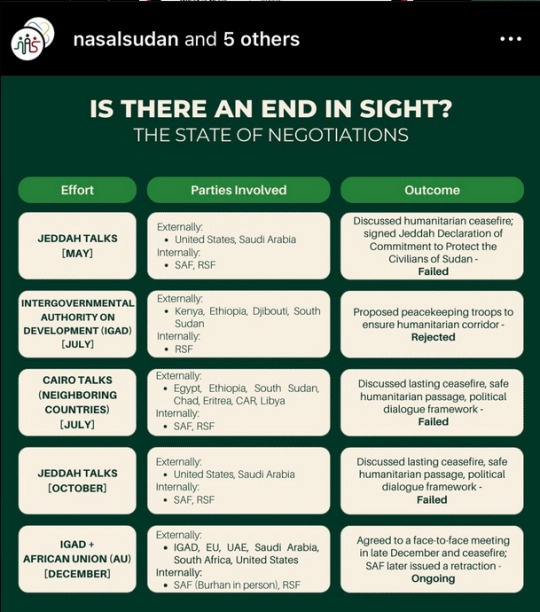

Transcript:
What is happening in Sudan?
The war, its origins, and the key players involved.
The war in Sudan
On April 15, a war broke out in Sudan's capital city of Khartoum between the Sudanese Armed Forces (SAF), and a paramilitary group known as the Rapid Support Forces (RSF).
Since then, eight months of conflict has led to major destruction of Khartoum's infrastructure, the most developed region of Sudan, with fighting also spreading to the regions of Darfur in the west and Kordofan in the south.
Civilians in conflict zones have been forcibly displaced, under threat of physical and sexual violence, particulary by the RSF, which has looted, destroyed, and settled in people's homes.
In the western region of Darfur, a campaign of ethnic cleansing is being carried out by the RSF targeting the Masalit tribe. Allegations of genocide have been levied against the RSF.
Reports have just emerged that fighting has now spread to Wad Madani in AI Gazira state, which houses nearly 500,00 IDPs from Khartoum.
Key Figures: Abdel Fattah al Burhan (head of SAF), Omar El-Bashir (deposed dictator of Sudan), Mohamed Dagalo (Hemidti) (head of RSF)
Sudan: the war in numbers
24.7 million in need of critical humanitarian assistance
6.7 million displaced [5.4 million IDPS, 1.3 million refugees]
7,000+ cholera cases an increase of +136% over the past month
20.3 million people acutely food insecure- 4.9 million facing emergency hunger levels
19 million children are out of school
70-80% of hospitals out of service in conflict areas
FAQ - THE SAF
What is the SAF?
stands fro the Sudanese Armed Forces
is the de-facto government of Sudan
is headed by Lt. General Abdel Fattah al-Burhan
What is their capacity?
estimated to have aprox. 200,000 personnel and tactical advantage of airforce
currently control of relative northern and eastern regions of Sudan with functioning capital in Port Sudan (East)
Do they have backing and support?
on the international stage, primarily backed by Egypt
limited weapons supply from allies
internally, the SAF is ultimately considered the lesser of two evils
FAQ - THE RSF
What is the RSF?
stands fro Rapid Support Forces
paramilitary group originating from the Janjaweed, Arab tribal militias armed by al-Bashir in 2003 to fight against ethnically African rebel groups in Darfur + carried out 2003 genocide
is headed by General Mohamed Hamdan Dagalo (Hemidti)
What is their capacity?
estimated to have 100,000 to 150,000 troops
winning the ground fight in Khartoum and control 4/5 states in Darfur
Do they have backing and support?
on the international stage, primarily backed by the UAE
have steady weapons supply chain and diversified financial profile with critical assets in UAE and Russia
The war in Sudan: contextualizing April 15
6/1989 - 4/2019 - The Bashir Regime
Sudan was under the rule of military dictator Omar Al-Bashir for 30 years, who came to power through an military coup backed by Islamist factions in June of 1989
His time in power was marked by extreme repression, conflict, and economic decline
12/2018 - current - The revolution
In December of 2018, a popular democratic revolution began taht eventually unseated al-Bashir on April 11 through the revolt of security sector
Al-Bashir was ultimately replaced by al-Burhan, with Hemidti as his deputy of a Transitional Military Council
Protestors rejected military rule and continued to hold a sit-in outside the military headquarters until its violent dispersal on June 3 of 2019 by the SAF + RSF
Today, the Sudanese people still hope and advocate for freedom from the military rule and the transition to democracy
8/2019 - 10/2021 - Transitional Government
Agreement on transitional government signed between civilian forces and Transitional Military Council on August 17, 2019
Led to formation to joint sovereign council with Abdalla Hamdok as Prime Minister
10/2021 - Current - The Oct 25, 2021 Coup
Burhan and Hemidti carry out military coup overthrowing civilian counterparts
They draw power from international legitimization despite prolonged mass protests in Sudan
12/2022- The Framework Agreement
In December of 2022, civilians put out a framework agreement signed onto by SAF and RSF + civil society groups and political parties meant to return to a transitional government - key part of agreement: question of integration of the RSF into the SAF
Parties were to finalize the agreement and sign on April 1; RSF and SAF ultimately disagreed on the integration timeline with RSF wanting 10 years and the SAF wanting 2
12/2022-4/2023 - The Lead up to April 15
As framework agreement negotiations failed, both parties began mobilizing troops in capital of Khartoum in days leading up to April 15
Residents of Khartoum awoke to the sounds of gunfire on April 15 and by noon, the RSF had seized Meroe airport in the Northern state
Conflict today considered a battle of power between the two generals they are too far in to walk back
Framing alliances
Sudnese Armed Forces (SAF):
Saudi Arabia
armed groups- rebel groups that had taken up arms against the central government in the Bashir Era are forced to ally with the SAF due to the RSF's ethnic cleansing campaign. They include: Justice and Equality Movement (Gibril Ibrahim), Sudan Liberation Movement/Army (Minni Minawi), Gathering of Sudan Liberation Forces (Abdallah Yahya)
Ukraine (SOF)
Iran
Islamists
Israel (Foreign Ministry)
Egypt
Rapid Support Forces (RSF):
United Arab Emirates
Central African Republic
Russia (Wagner Group)
Chad
Arab Tribal Leaders- Arab tribal leaders across the Western region of Darfur have pledged their allegiance and support to the RSF, with members of the tribes across the Sahel crossing into Sudan to join the RSF's assault as well. Key tribes include: Beni Halba, Tarjam, Habaniya, Fallata, Misseriya, Taaysha, Rizeigat
Libya (Khalifa Haftar)
Israel (Mossad)
Is there an end in sight?
The state of negotiations
Effort- Jeddah Talks [May]
Parties Involved- Externally: United States, Saudi Arabia. Internally: SAF, RSF
Outcome: discussed humanitarian ceasefire; signed Jeddah Declaration of Commitment to Protect the Civilians of Sudan- FAILED
Effort- Intergovernmental authority on development (IGAD) [July]
Parties Involved- Externally: Kenya, Ethiopia, Djibouti, South Sudan . Internally: RSF
Outcome: proposed peacekeeping troops to ensure humanitarian corridor-REJECTED
Effort- Cairo talks (neighboring countries) [July]
Parties Involved- Externally: Egypt, Ethiopia, South Sudan, Chad, Eritrea, CAR, Libya. Internally: SAF, RSF
Outcome: discussed lasting ceasefire, safe humanitarian passage, political dialogue framework-FAILED
Effort- Jeddah talks [October]
Parties Involved- Externally: United States, Saudi Arabia . Internally: SAF, RSF
Outcome: discussed lasting ceasefire, safe humanitarian passage, political dialogue framework-FAILED
Effort- IGAD + African Union (AU) [December]
Parties Involved- Externally: IGAD, EU, UAE, Saudi Arabia, South Africa, United States. Internally: SAF (Burhan in person), RSF
Outcome: agreed to face-to-face meeting in late December and ceasefire; SAF later issued a retraction-ONGOING
What can you do?
The conflict in Sudan calls for the collective support of all to raise awareness about war and aid the Sudanese people on the ground, especially when we live in nations that have been complicit in the oppression of the Sudanese people. Explore the potions below and share with others.
Educate yourself- deepen your knowledge about Sudan, empowering yourself with insights into the complexities of the situation.
Donate- extend a helping hand to Sudan by generously donation to individuals or grassroots organizations on the ground.
Contact your reps- amplify your impact by contacting your representatives, avocating for positive change
221 notes
·
View notes
Text
Sudan’s rival generals have ignored warnings of mass starvation. In more than a year of brutal war, the two military factions have weaponized humanitarian aid.
Sudan’s de facto leader, military chief Abdel Fattah al-Burhan, has blocked aid into at least half of the country under the control of the paramilitary Rapid Support Forces (RSF) headed by Mohamed Hamdan Dagalo, known as Hemeti. Meanwhile, the RSF is obstructing trucks into places held by the Sudanese Armed Forces (SAF). Local volunteers running soup kitchens have been targeted and killed by the RSF, particularly in Khartoum, Sudanese aid workers told FP.
The conflict has created the world’s largest hunger and internal displacement crises. The fighting has pushed 25 million people, more than half the nation’s population, into acute hunger and forced about 11 million people to flee their homes, including 2.3 million who fled abroad. More than two million Sudanese could die by the end of this year, aid agencies warn.
In areas where there is food available, extortion and attacks on traders at checkpoints have raised prices. Women have recounted having sex with SAF soldiers in exchange for food. Reports of torture, rape, the use of children under 15 in the fighting, and ethnic-based massacres by the RSF and armed militias have surged over the past year.
“People are dying of hunger in the capital,” said Mathilde Vu, the Norwegian Refugee Council’s advocacy advisor in Sudan. “We are looking at the risk of starvation being used as a weapon of war. … This needs to be monitored. The policymakers already have a tool for that. The U.N. Security Council resolution about conflict and hunger, and what they need to put in place is a monitoring of that.”
Both sides in Sudan’s nearly 17-month civil war have committed “harrowing” abuses that may amount to war crimes, a U.N.-mandated mission reported on Friday, calling for a countrywide arms embargo. Sudan’s military government rejected a proposal by U.N. experts to deploy a peacekeeping force to protect civilians.
Compounding the situation, the humanitarian response is critically underfunded. A $2.7 billion U.N. appeal has been just 32 percent funded. Much of that funding has come from the United States. However, aid agencies say local volunteers on the ground need to be better supported since a cease-fire is highly unlikely in the immediate future.
Famine was declared in Zamzam camp housing about 500,000 displaced people near the besieged city of El Fasher, the state capital of North Darfur—areas where the RSF is blocking aid trucks. There’s a realistic chance of famine in 16 other areas, Vu said, but precise figures are hard to confirm. Last month, the SAF agreed to open the Adré border crossing from landlocked Chad into Sudan, for a period of three months. But international aid agencies told FP that the SAF has made things difficult through lengthy authorizations ensuring only a trickle of shipments gets in.
U.S. envoy for Sudan Tom Perriello visited Saudi Arabia, Egypt, and Turkey this week in the latest attempt by the Biden administration to expand humanitarian access in Sudan, following failed peace talks in Geneva. The conflict risks turning into a forever war, in which various external actors seize the opportunity to extend their influence. Turkey, Egypt, the United Arab Emirates (UAE), and Russia have been accused of arming warring parties.
While such negotiations are essential, U.S. attention and pressure should also focus on other regional powers with a vested interest in the conflict such as Eritrea and Ethiopia. Foreign mercenaries from Chad, Mali, Niger, the Central African Republic, and Libya are believed to be fighting in Sudan.
Pressuring regional powers could engage local armed militias allied to the warring parties in ultimately ensuring access to places like El Fasher. “It will create more of a buffer than two guys signing an agreement in Jeddah” and then breaking it, Vu said. “You cannot bypass the regional powers. … They really are the ones who have the leverage. It’s very important that Western powers engage them so that they have a constructive role in this crisis rather than a harmful one,” she added. Even if Burhan and Hemeti signed a peace deal, many of the local armed groups involved would likely not abide by it.
Both generals have held meetings with several African leaders, while the African Union has been largely absent in peace negotiations. More recently, Burhan held meetings with Eritrea’s president, Isaias Afwerki, and Ethiopia’s prime minister, Abiy Ahmed, at the China-Africa summit.
67 notes
·
View notes
Text
{Why is Telegram a big headache for the Jews, USA and France?
Why did they decide to literally kidnap the owner Pavel Durov at the Paris Airport?

Pavel Durov, founder and CEO of Telegram, was arrested today in France, there are different charges against him.
Telegram is the main source of information about the Israeli genocide and massacre in Gaza.
Thousands of videos of Jews massacring children have been posted on Telegram channels by journalists living in Gaza.
Israel is trying to stop that flow of information and that is why it has killed over 100 journalists in Gaza alone.

The most accurate information about the situation on the ground in Ukraine comes out on Telegram, and NATO can't control it.
Many people use Telegram as their source of information because the information comes directly from the field.
Many dead NATO soldiers appear on Telegram and the CIA and NATO command can no longer hide their direct involvement in the war broke out in Russia.

Telegram did a lot of damage to the French army in Africa.
The Africans organized all their protests, resistance and everything else against the French occupation forces through Telegram.
Russian mercenaries, obviously, use different platforms, but Telegram played for them an important role in accelerating the deterioration of France's military posture, especially in Africa.

This is a famous photo of Telegram founder Pavel Durov giving Putin his middle finger.
In 2011, Durov said that the Russian government had requested him to cancel the accounts of anti-government figures on his social media platform.
Durov not only did not follow, but also publicly released this photo of "raising the middle finger to Putin" in the media, which received cheers from the West.
After the 2014 Ukrainian coup, Durov refused to provide the Russian government with information on users involved in the Ukrainian colorful revolution.
In the same year, he left Russia, claiming that Russia was "unable to keep up with the information age". Shortly after, he acquired French and UAE citizenship and stated that he had no plans to return to Russia.
Today, Durov was arrested by France on charges of using the platform to "support terrorist activities" and "pedophilia" after refusing to provide user information to the United States and Israel, facing 20 years of imprisonment.

Durov helped Ukrainians stage a coup d'état in 2014.
Then the whole West glorified him.
He also trolled the Russian FSB and sent them the “encryption keys” to telegram in 2017.
Back then the west cheered his fight on.


The founder of Telegram has been detained by French intelligence services at Le Bourget Airport in Paris while exiting a private jet.
He is expected to be presented to a judge later this evening, facing multiple charges, according to TF1.
Potential charges include terrorism, drug-related offenses, complicity, fraud, money laundering, concealment, and possession of child exploitation content.
The main concern of EU authorities regarding Telegram is its encrypted messaging, as reported by TF1}

{And despite Durlov helped NATO in the 2014 coup in Ukraine, Russia is working to free Telegram founder Pavel Durov after he was arrested in France.}


If Pavel Durov could be arrested on these charges, then any country can arrest the leaders of Facebook, Google, Apple, Microsoft… any tech company that helps people communicate!
France is a 🤡 puppet of USA and Israel, who are mad at not having backdoor to Telegram.
Regarding Pavel Durov, Julian Assange, TikTok, Scott Ritter etc. etc. ⬇️
"The illusion of freedom will continue as long as it's profitable to continue the illusion. At the point where the illusion becomes too expensive to maintain, they will just take down the scenery, they will pull back the curtains, they will move the tables and chairs out of the way and you will see the brick wall at the back of the theater." Frank Zappa
58 notes
·
View notes
Text
it's a great little like, technological pun that Israeli and South African military designs are historically so similar - the average gun produced for their 'defence forces' by private contract-bidders is a like, automatic riot-control grenade launcher that fires gyrojets, which is easily stowed in their average vehicle, a tank that looks like an excavator factory's best impression of an attack-schoolbus
73 notes
·
View notes
Text
AN ARTICLE ON THE BRITISH LOOTING FROM AFRICA
AND SUFFERING OF AFRICANS
The British should return every loot of all kinds back to Africa
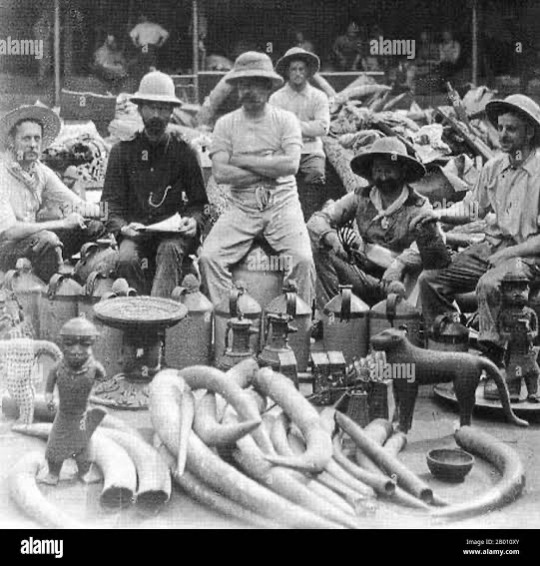

IF THEY CONDEMN SLAVE TRADE THEY SHOULD START BY RETURNING THE LOOTS COLLECTED FROM AFRICA ALL IN THE NAME OF TRADE AND RELIGION ,IF OUR CULTURE WAS BAD WHY DID THEY TAKE AWAY OUR HERITAGE AND STORE THEM IN A MUSEUM ?
The looting of Africa during the colonial era occurred through a combination of methods and strategies employed by European colonial powers, including Britain. Here are some of the ways in which Africa was looted during this period:
Military Conquest: European colonial powers, including the British, often used military force to conquer and control African territories. This involved armed conflicts, wars of conquest, and the suppression of local resistance movements. Through these military campaigns, colonial powers gained control over land and resources.
Resource Extraction: One of the primary motivations for colonialism in Africa was the exploitation of its abundant natural resources. European colonial powers, including Britain, extracted valuable resources such as minerals, rubber, timber, and agricultural products from African colonies. These resources were often taken for the economic benefit of the colonial powers.
Forced Labor: Colonial powers imposed forced labor systems on Africans to work in mines, plantations, and other labor-intensive industries. These labor practices were exploitative and often involved harsh working conditions and little compensation.
Taxation and Economic Exploitation: Africans were subjected to unfair taxation systems that drained wealth from their communities. Colonial administrations imposed taxes on land, crops, and other economic activities, forcing Africans to generate revenue for the colonial authorities.
Land Dispossession: Africans frequently lost access to their ancestral lands as colonial governments allocated land to European settlers and corporations. This land dispossession disrupted traditional agricultural practices and led to social and economic dislocation.
Confiscation of Cultural Artifacts: Colonial powers often confiscated cultural artifacts, sculptures, art, and religious items from Africa. These items were frequently transported to Europe and ended up in museums, private collections, or auction houses.
Unequal Trade Agreements: Colonial powers imposed trade agreements that favored their own economies. Africans often received minimal compensation for their raw materials and agricultural products, while European countries reaped significant profits from these trade relationships.
Suppression of Indigenous Cultures: The suppression of indigenous African cultures and languages was another aspect of colonialism. European powers sought to impose their own cultural norms and values, often devaluing or erasing African traditions.
Missionaries played a complex role in the context of colonialism and the looting of Africa. While their primary mission was to spread Christianity and convert indigenous populations to Christianity, their activities and interactions with colonial authorities had various effects on the looting of Africa:
1. Cultural Influence: Missionaries often sought to replace indigenous African religions with Christianity. In doing so, they promoted European cultural norms, values, and practices, which contributed to cultural change and, in some cases, the erosion of traditional African cultures.
2. Collaboration with Colonial Powers: In some instances, missionaries worked closely with colonial authorities. They provided moral and religious justification for colonialism and sometimes acted as intermediaries between the colonial administration and local communities. This collaboration could indirectly support the colonial exploitation of resources.
3. Access to Resources: Missionary activities occasionally granted them access to valuable resources and artifacts. They may have collected religious objects, manuscripts, and other items from indigenous communities, which were sometimes sent back to Europe as part of ethnographic or religious collections.
4. Education and Healthcare: Missionaries established schools, hospitals, and other institutions in African communities. While these services were aimed at spreading Christianity, they also provided education and healthcare to local populations, which could have positive impacts on individuals and communities.
5. Advocacy for Indigenous Rights: Some missionaries, particularly in later years, became advocates for the rights of indigenous populations. They witnessed the injustices of colonialism and spoke out against the mistreatment of Africans, including forced labor and land dispossession.
6. Conversion and Social Change: The conversion of Africans to Christianity brought about significant social changes in some communities. It could lead to shifts in social hierarchies, family structures, and gender roles, sometimes contributing to social upheaval.
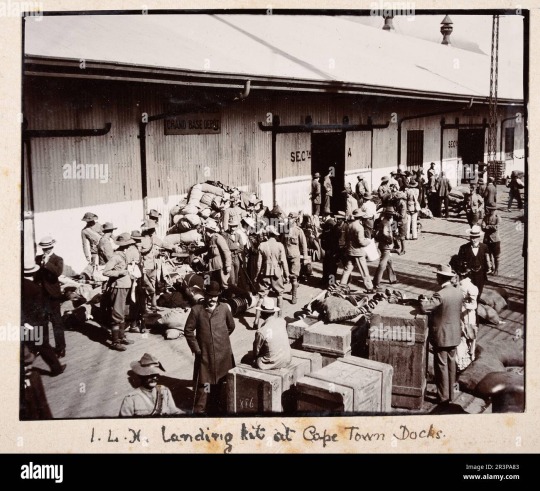

1. Cultural Bias: The British, like many Europeans of their time, often viewed their own culture, including Christianity, as superior to the indigenous cultures and religions they encountered in Africa. This cultural bias led to the condemnation of indigenous African religions and gods as "pagan" or "heathen."
2. Religious Conversion: Part of the colonial mission was to spread Christianity among the indigenous populations. Missionaries were sent to Africa with the aim of converting people to Christianity, which often involved suppressing or condemning traditional African religions and deities seen as incompatible with Christianity.
3. Economic Interests: The British Empire, like other colonial powers, was driven by economic interests. They often saw the resources and wealth of African societies as valuable commodities to be exploited. This economic agenda could involve looting or confiscating sacred artifacts, including religious objects, for financial gain.
4. Ethnographic Research: Some British colonial officials and scholars engaged in ethnographic research to study African cultures, including their religious practices. While this research aimed to document indigenous cultures, it could sometimes involve the collection of religious artifacts and objects, which were then sent to museums or private collections in Europe.
5. Cultural Imperialism: Colonialism was not just about economic and political domination; it also involved cultural imperialism. This included an attempt to impose European cultural norms, values, and religious beliefs on African societies, often at the expense of indigenous traditions.
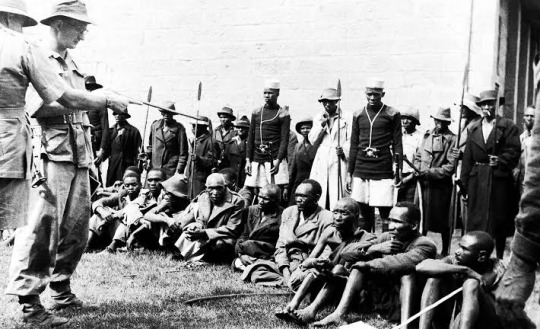
The issue of repatriating cultural artifacts looted from Africa during the colonial era has gained significant attention in recent years. Countries and communities in Africa have long called for the return of these treasures, which hold deep cultural and historical significance. Among the former colonial powers, Britain stands at the forefront of this debate. This article explores the ongoing discussion surrounding Britain's role in returning looted artifacts to Africa.
A Legacy of Colonialism:
Britain's colonial history left a profound impact on many African nations, including the removal of countless cultural treasures. During the height of the British Empire, valuable artifacts, sculptures, manuscripts, and sacred items were taken from their places of origin. These items found their way into the collections of museums, private collectors, and institutions in Britain.
The Case for Repatriation:
Advocates for repatriation argue that these artifacts rightfully belong to the countries and communities from which they were taken. They emphasize the importance of returning stolen cultural heritage as a step towards justice and reconciliation. Many African nations view these artifacts as integral to their cultural identity and heritage.
International Momentum:
In recent years, there has been a growing international momentum to address this issue. Museums and institutions worldwide are engaging in discussions about repatriation. Some institutions have initiated efforts to return specific items to their countries of origin, acknowledging their historical and moral responsibility.
Britain's Response:
Britain, home to several renowned museums housing African artifacts, has faced increasing pressure to address this issue. The British Museum, for instance, has faced calls to repatriate numerous artifacts, including the Benin Bronzes and the Elgin Marbles, which have origins in Africa and Greece, respectively.
In response to these demands, some British institutions have started to collaborate with African countries to explore the possibility of returning certain artifacts. These discussions aim to find mutually agreeable solutions that respect both the historical context and the cultural significance of these items.
Challenges and Complexities:
Repatriation is a complex process involving legal, ethical, and logistical challenges. Determining rightful ownership and ensuring proper care and preservation upon return are critical considerations. Additionally, questions arise about how to address the legacy of colonialism and rectify historical injustices.
The Way Forward:
The debate over repatriation is ongoing and highlights the need for respectful dialogue and cooperation between nations. While the return of looted artifacts is an essential step, it should also be part of broader efforts to promote cultural understanding, collaboration, and acknowledgment of historical wrongs.
The issue of Britain returning looted artifacts to Africa is part of a global conversation about justice, cultural heritage, and historical responsibility. While there are complexities to navigate, the growing recognition of the importance of repatriation signifies a potential path forward towards reconciliation and healing between nations and their shared history. The ongoing discussions reflect a commitment to addressing past injustices and fostering a more inclusive and culturally rich future.
They condemn slave trades yet they’re still with our treasures and cultural artifacts and heritage
#life#animals#culture#aesthetic#black history#blm blacklivesmatter#anime and manga#architecture#black community#history#blacklivesmatter#black heritage#heritage
216 notes
·
View notes
Photo

Kingdom of Axum
The African Kingdom of Axum (also Aksum) was located on the northern edge of the highland zone of the Red Sea coast, just above the horn of Africa. It was founded in the 1st century CE, flourished from the 3rd to 6th century CE, and then survived as a much smaller political entity into the 8th century CE.
The territory Axum once controlled is today occupied by the states of Ethiopia, Eritrea, Djibouti, Somalia, and Somaliland. Prospering thanks to agriculture, cattle herding, and control over trade routes which saw gold and ivory exchanged for foreign luxury goods, the kingdom and its capital of Axum built lasting stone monuments and achieved a number of firsts. It was the first sub-Saharan African state to mint its own coinage and, around 350 CE, the first to officially adopt Christianity. Axum even created its own script, Ge'ez, which is still in use in Ethiopia today. The kingdom went into decline from the 7th century CE due to increased competition from Muslim Arab traders and the rise of rival local peoples such as the Bedja. Surviving as a much smaller territory to the south, the remnants of the once great kingdom of Axum would eventually rise again and form the great kingdom of Abyssinia in the 13th century CE.
Name & Foundation
The name Axum, or Akshum as it is sometimes referred to, may derive from a combination of two words from local languages - the Agew word for water and the Ge'ez word for official, shum. The water reference is probably due to the presence of large ancient rock cisterns in the area of the capital at Axum.
The region had certainly been occupied by agrarian communities similar in culture to those in southern Arabia since the Stone Age, but the ancient kingdom of Axum began to prosper from the 1st century CE thanks to its rich agricultural lands, dependable summer monsoon rains, and control of regional trade. This trade network included links with Egypt to the north and, to the east, along the East African coast and southern Arabia. Wheat, barley, millet, and teff (a high-yield grain) had been grown with success in the region at least as early as the 1st millennium BCE while cattle herding dates back to the 2nd millennium BCE, an endeavour aided by the vast grassland savannah of the Ethiopian plateau. Goats and sheep were also herded and an added advantage for everyone was the absence of the tropical parasitic diseases that have blighted other parts of sub-Saharan Africa. Wealth acquired through trade and military might was added to this prosperous agricultural base and so, in the late 1st century CE, a single king replaced a confederation of chiefdoms and forged a united kingdom that would dominate the Ethiopian highlands for the next six centuries. The kingdom of Axum, one of the greatest in the world at that time, was born.
Continue reading...
57 notes
·
View notes